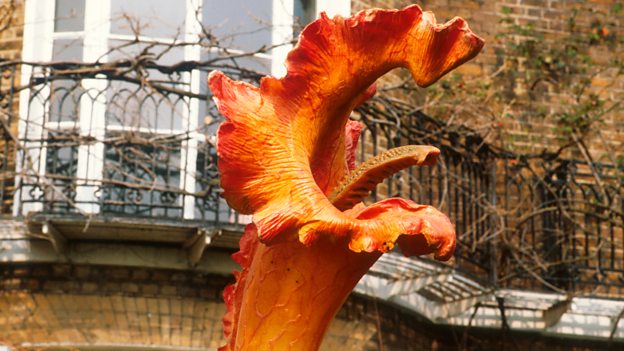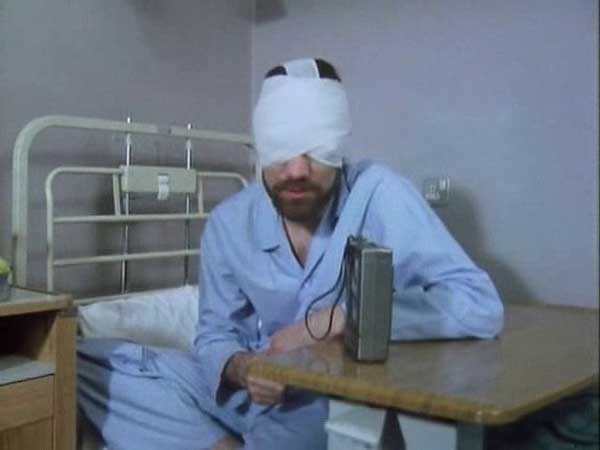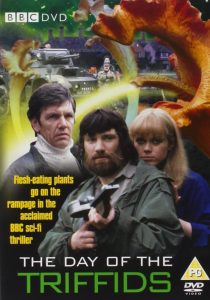This week my DAY OF THE TRIFFIDS retrospective reaches peak point. If you’ve read my earlier posts you’ll know that a). TRIFFIDS is my favourite book and it’s had an enormous influence on my writing and b). I’m currently working my way through the various film and TV adaptations. I’ve made no secret of the fact that I’d love to write the screenplay for a Triffids movie/miniseries, so I’ve been looking at the pluses and minuses of each version to try and understand why they’ve succeeded or failed. Today we get to the 1981 BBC TV version which is, without question, the most faithful adaptation of John Wyndham’s story yet produced.
Back in the day, when there were only three UK TV channels and we were on the cusp of the home video revolution, this adaptation of TRIFFIDS occupied the primetime. It faired pretty well, with decent viewing figures, favourable reviews and plenty of media coverage. Following the release of the novel in 1951, the name Triffid came to be used to describe any over-sized or vaguely menacing-looking plant, and the beautiful design of the 1981 creature (for want of a better word) also became unexpectedly iconic. I wrote previously about how hard it must be to visualise a genuinely threatening, seven-foot tall, walking carnivorous plant, and yet visual effects designer Steve Drewett did just that. Their vivid colouring, their stings dripping with poison, and their borderline flamboyant, quiff-like styling resulted in a realisation of the Triffids like nothing seen previously or since. There’s an arrogance to their appearance. It’s almost as if they want you to come and have a go if you think you’re hard enough.
But before I get into the detail and explain why I think this adaptation works so well, let’s watch the title sequence and enjoy the theme music by Christopher Gunning. I say enjoy, but if I’m honest, at the tender age of eleven, these titles scared me just about as much as the Triffids themselves!
Produced by David Maloney, one of the driving forces behind BLAKE’S 7, the six, thirty minute episode format of the 1981 adaptation of Triffids gave the writer and director space to breathe. Gone are the constraints of making a single ninety-minute movie and, as a consequence, the series is able to more closely follow Wyndham’s original novel. There are some deviations which make the story feel somewhat uneven, but these can largely be forgiven. There’s a cliffhanger at the end of every episode, for example, and these are frequently ineffective and forced. And it wouldn’t have made any sense for there to be a time jump in the middle of a chapter, so the final episode is set six years later and, as a result, feels superfluous. I’d have preferred a longer exploration of Bill Masen’s journey and for the series to have ended at the point where he’s reunited with Josella. It robs the story of the climax it deserves.

Throughout the opening episodes, this version of Triffids barely puts a foot wrong. By necessity it takes some liberties with the source material, but the changes introduced by screen writer Douglas Livingstone are carefully done and are in keeping with the tone of the book. Those who’ve read the novel will know that there’s a huge exposition dump early on, where Bill explains his history, and his history with Triffids, to the reader. Livingstone cleverly enables this by having Bill, in hospital with his eyes bandaged as a result of a Triffid sting, preparing an audio ‘letter’ to a friend by recording his memories on cassette.
It takes Bill the entire first episode to get out of hospital, but by the time the second instalment arrives, we’re deep into Wyndham’s familiar apocalyptic territory. There are many memorable scenes here: the blind woman desperately trying to open a tin of cat food to eat; the man who, with a rope tied around his waist and his wife holding the other end to keep him safe, edges out into his back garden to pick vegetables to eat, only to be struck down by a Triffid; the pack of zombie-like blind people who crowd around cars and bang their hands against the locked doors of the pub where Bill and Jo take shelter, desperate to get inside; the man who was blind before the comet display who now walks along the street with his white stick, unable to quite work out why the world feels so different this morning…

There’s very little sensationalism on show here. It’s a slow-moving apocalypse which succeeds by remaining reasonably in time with the beats of the original novel. Visual effects are largely (and wisely) kept to a minimum, with some magnificent sound design adding to the unease. The cast is strong: John Duttine is a spot-on Bill Masen, with good support from Maurice Colbourne as Coker and Emma Relph as Jo.

It’s hard to believe that this adaptation was made thirty years after the original publication of the novel, and that it’s now another forty years since the series was first broadcast. As you’d expect, there are many aspects which now feel simplistic and outdated, and yet the series doesn’t suffer unduly as a result of this. It’s a technically limited adaptation with problems symptomatic of the time – for example, the jarring cuts between exterior scenes recorded on film, and studio scenes recorded on videotape – but these issues don’t detract, and I think I know why that is.
When you boil it down to basics, THE DAY OF THE TRIFFIDS isn’t a story about blind people or about carnivorous walking plants, it’s about a handful of survivors trying to come to terms with what has happened to the world about them. Like all the best post-apocalyptic fiction, it’s about human reactions and interactions. As was seen in the earlier film adaptation (and as we’ll see again in the second BBC TV version), it’s so easy to put the Triffids front and centre and let them steal the show. That’s the opposite of what the story needs, and I believe it’s why this version works so well. Less is most definitely more.
And that’s a lesson the team behind the next version of Triffids definitely didn’t pay attention to in school.
The 1981 version of DAY OF THE TRIFFIDS is available on DVD from all the usual outlets.
Thanks for reading.
Over the years I’ve recommended many films, books, and podcasts. You can find a full list of them here.
A lot of folks find their way to this site from search engines and social media. If you’re new here, let me introduce myself – I’m DAVID MOODY, author of dystopian horror and science-fiction. I’m best known for the HATER and AUTUMN novels, but you can find all my books here.
If you sign up to my mailing list, I’ll send you some free books to get you started.


